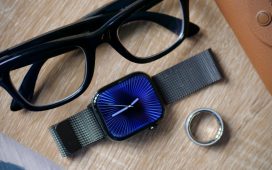Welcome to FindBiometrics’ digest of identity industry news. Here’s what you need to know about the world of digital identity and biometrics today:

NSF Funding Fuels Smartphone Grip Biometrics Research
A Louisiana State University researcher has received over $470,000 in funding from the National Science Foundation to further research a unique form of mobile biometric authentication based on how a users holds their device. LSU Computer Science Assistant Professor Chen Wang first got attention early last year with his explorations of acoustic hand mapping, in which ultrasonic emissions are project from a smartphone, and sophisticated AI is used to map out how these signals interact with the hand holding the device. A paper on the topic, co-authored with Long Huang, was accepted by the Institute of Electrical and Electronics Engineers (IEEE) Symposium on Security & Privacy last year.
Taliban Use Biometrics to Hunt Enemies
A year and a half after reports emerged that Afghanistan’s Taliban government had seized biometric technology left behind by retreating US forces, the group now appears to be using the tech to hunt down former members of the US-aligned Afghan National Defence and Security Forces (ANDSF). The news comes by way of an inspector general report, which indicates that fingerprint matching is aiding the Taliban in their searches. American forces had reportedly used Handheld Interagency Identity Detection Equipment that stored fingerprint and iris data on-device.
Biometric Airport Screening Expands in UAE
Authorities are halfway through the installation of a face-based biometric passenger processing system at Sharjah Airport in the United Arab Emirates, according to Sharjah Airport Authority director Sheikh Faisal bin Saoud Al Qassimi. It’s the latest sign of enthusiasm about biometric technology in the UAE after authorities began trialing a curb-to-gate biometric system at Abu Dhabi Airport toward the end of last year. Al Qassimi expects Sharjah Airport’s system to be complete in the fourth quarter of this year.
Vivalink Platform to Be Used in Clinical Trial
Vivalink’s Biometrics Data Platform is about to be used in a six-month clinical trial at UC San Francisco that will assess the effects of exercise on cardiac health, with a focus on Hypertrophic Cardiomyopathy (HCM), a potentially fatal heart condition. Study subjects will be outfitted with Vivalink’s wearable ECG sensor, which will track electrical activity, including heart rate metrics, and transmit it to Vivalink’s cloud data platform. The UCSF study is funded by the National Heart, Lung, and Blood Institute of the National Institutes of Health.
New Partnership Brings AU10TIX to Southern Africa
Israel-based AU10TIX has entered the South African market thanks to a new partnership with InfoTech, a prominent IT services provider established in 1980. InfoTech will offer AU10TIX’s biometric identity verification solution to customers in its home country as well as Botswana and Namibia, with InfoTech CEO Mauritz du Toit emphasizing that “Southern African banks, financial service providers, retailers and even organisations that must verify the identity of teams on-site are becoming bogged down by manual identity verification processes.” AU10TIX says its user-friendly solution can complete onboarding in less than 90 seconds.
FPC Reports Smart Lock Integration, Mobile Sensor Order
Fingerprint sensor technology from Fingerprint Cards is being used in a new smart door lock from Xiaomi, the Xiaomi Mi Smart Door Lock M20. In announcing the integration, Fingerprint Cards explained that its tech was provided in a “bundle” comprising its FPC1523 fingerprint sensor, biometric software, and a third-party MCU. “This bundle makes it easier for our customers to integrate the solution in their products,” the company stated, with FPC’s Mobile, PC & Access China President Haiyuan Bu added that the company is currently developing an MCU of its own.
FPC is also reporting that it has received a second volume purchase order for its optical under-display fingerprint sensor solution for mobile devices. A design win for the FPC1632 marked Fingerprints’ entry into the new optical under-display segment of the mobile fingerprint sensor market last summer, and FPC went on to report its first volume order near the turn of the year. That was from an unnamed Asia-based smartphone OEM; and the latest is from another one.
Shufti Pro Gets ISO/IEC 27001: 2013 Certification
Shufti Pro has obtained ISO/IEC 27001: 2013 certification. The standard pertains to best practices for organizations’ storage of data, including the management of data security risks. The news comes after Shufti Pro announced a new risk assessment tool for customers last month, alongside an ‘eIDV’ service that is designed to match end users’ government-issued identity numbers against government databases.
Biometrics Institute Publishes New Paper
The Biometrics Institute has published a new paper on “Digital Identity and Biometric Authentication“. It’s aimed at providing guidance and best practices to organizations seeking to implement such solutions. “Biometric technology is not a one-size-fits-all solution and should be evaluated on a case-by-case basis,” explained Brett Feldon, the head of the Institute’s Digital Identity Group. “Factors such as the sensitivity of the information being accessed, and the level of security required should be considered when determining whether biometrics is an appropriate technology choice.”
–
March 2, 2023 – by Alex Perala
You’ll need to register to continue reading – it’s free and only takes a moment:











